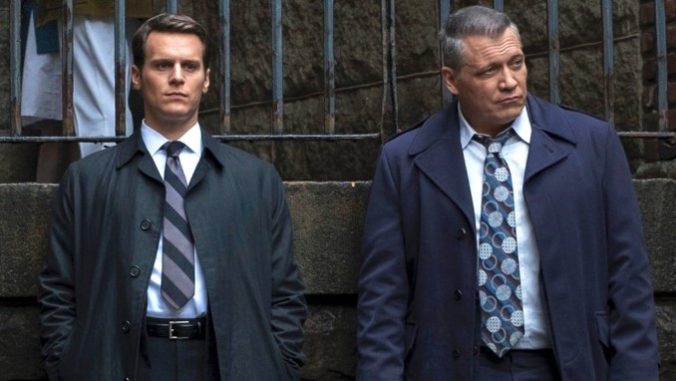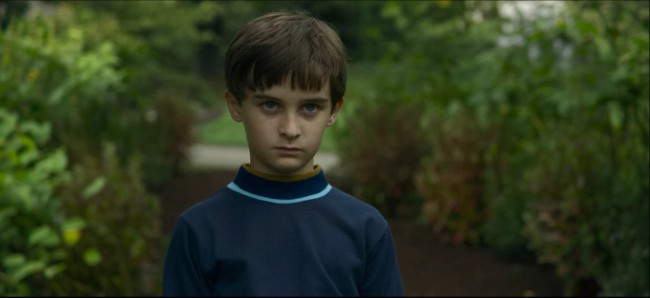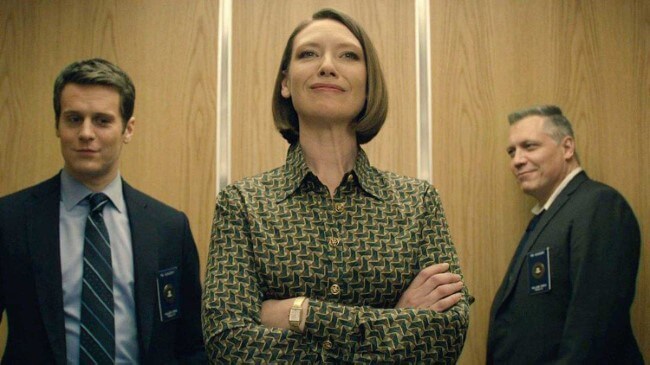It Still Stings: Mindhunter‘s Sidelining Robbed Us of a Killer Conclusion
Photos via Netflix TV Features Netflix
Editor’s Note: TV moves on, but we haven’t. In our feature series It Still Stings, we relive emotional TV moments that we just can’t get over. You know the ones, where months, years, or even decades later, it still provokes a reaction? We’re here for you. We rant because we love. Or, once loved. And obviously, when discussing finales in particular, there will be spoilers:
![]()
It’s safe to say that in recent years, Netflix has struggled to generate the kind of “prestige” dramas that still routinely draw viewers and critical buzz to premium cable networks or streamers such as HBO. Few among us could hope to understand the demographics being sought by such a massive entertainment juggernaut, or decrypt the desires of the unknowable algorithm as it tries to translate social media hype and bots sharing GIFs into subscriber predictions for three quarters from now. Trying to account for every variable would take supremely gifted intuition and insight into the human condition … the exact skillset of the fictional (but reality inspired) protagonists of Mindhunter. And Netflix let Mindhunter lay fallow, so who’s going to save us now?
The drama devised by creator-writer Joe Penhall and showrunner David Fincher was the rarest kind of Netflix project—a beautifully rendered, big budget, period piece drama with near universal critical praise and audience plaudits to match. And yet, as is so often the case with these diamonds in the rough, the show simply didn’t seem to have the groundswell of support and widespread hype to match the adoration it received from its rapt viewers. At the very least, it wasn’t as widely adopted as Netflix seemingly demands every show be in order to avoid the ever-looming axe, although Mindhunter was never truly canceled with finality—instead, it was sent into “indefinite hiatus” as Fincher’s attention drifted by necessity to an array of other projects. That “hiatus” has now stretched for more than three years, and although rumblings of a Mindhunter revival always seem to be percolating, each passing month only renders a third season less likely when all is said and done.
And that truly is a shame, because Mindhunter was one of the most gripping, unnerving, brilliantly designed and powerfully acted series that Netflix has ever brought to the world of streaming. It’s also a painfully incomplete narrative, as its second season concluded with numerous major storylines dangling in space, robbed of their dramatic possibilities. Watching the series again in retrospect, it’s clear that Mindhunter had a map for where it was headed over several more seasons, but it feels very unlikely we’ll ever see the satisfying payoff of its journey into the darkest parts of the human psyche.
The Gnawing Uncertainty of Mindhunter’s World
If there’s one concept that Mindhunter illustrates to absolutely devastating effect, it’s the crippling emotional weight of uncertainty and doubt. This has always been one of its hallmarks, regardless of where the uncertainty is coming from. In the first season of the show, that doubt is felt radiating from the core cast, particularly Holt McCallany’s Bill Tench and Anna Torv’s Dr. Wendy Carr, as they weigh the wisdom of attaching their careers to young upstart Holden Ford (Jonathan Groff) in the fledgling days of the FBI’s Behavioral Science Unit. Few in the bureau are true believers in their work in the field that will become known as criminal profiling, nor does anyone—including our protagonists—understand much of the operating mindset of the criminals that we’ll all casually refer to as “serial killers” in the decades to follow. Holden, Bill and Wendy are like explorers peering over a vast, uncharted ocean fraught with peril and confusion, uncertain that the journey will yield anything of value at all. In their minds, it’s entirely likely that they’re throwing their careers away on wild speculation.
Of course, the pearls of invaluable insight they begin to coax from incarcerated killers quickly works to change the minds of Holden, Bill and Wendy, even if the work of the BSU often remains a harder sell to the higher-ups at the Bureau. In its first season, these spellbinding interview segments quickly became Mindhunter’s calling card, helping to get the show noticed by the viewers who became its core audience. The verisimilitude of the conversations with killers such as Ed Kemper and Jerry Brudos gives these interviews an intoxicating and deeply disturbing energy—you are watching some of the most evil human minds illustrate exactly the way their train of thought was operating as they planned to abduct and butcher other human beings, albeit in the context of what often feel like friendly, casual chit-chats. Even the most seasoned horror genre geek is likely to shiver, especially when viewing comparisons of just how accurate performers such as Cameron Britton (Kemper) managed to make their portrayals of these real-life killers.
It’s the second season of Mindhunter, though, that really brings the sheer frustration and gnawing doubt of the team’s work to center stage, as Holden and Bill spend time in Atlanta, investigating a spate of child murders that occurred between 1979-1981. This time around, we’re seeing not just the academic drive of someone like Holden to prove his theories, but the powerless rage of the families who lost their children, utterly convinced that they need to take the law into their own hands because they’re surrounded by an ineffectual justice system that fails to even recognize/acknowledge the presence of the killer, much less apprehend him. This real-life case was no doubt chosen for the frustratingly open-ended nature of its conclusion—a suspect is arrested, and although he’s clearly connected on some level to aspects of the crime, neither Holden nor the audience can feel confident that justice has truly been served when the desperate city leaders appear eager to pin the entirety of the murders on the single individual. There’s a maddening sense of unfinished business that infects both Holden and the viewer observing Holden’s story, knowing that those responsible may have escaped justice … and that same sense of frustration has now leaked out into Mindhunter’s broadcast history itself, thanks to the lack of a third season. It’s an outcome oddly appropriate to the thematic soul of the show, but deeply dissatisfying all the same.
There are simply so many threads of Mindhunter that were left dangling. Most prominently, there’s the personal life of the deeply devoted but often absent Bill Tench, who watches his marriage crumble and family life slip away, even as his 6-year-old adopted son Brian displays every possible manner of sociopathic warning sign. It would feel perhaps a bit overly neat or trite for Brian to grow up to be a serial killer himself in this narrative, being raised by one of the men at the heart of the first ever serial killer profiling division, but Tench’s unease and doubt about Brian is perfect material for a series-long arc that always has our protagonist on edge. If Bill declares himself to be a proponent of “nurture” vs. “nature” in the debate of what forges a fledgling killer, then surely he must recognize his own potential culpability and the deep responsibility before him if his son turns out to suffer from long-term emotional impairment or trauma. Season 2 often saw Bill going as far as he could out of his way to not turn the same analytical eye he utilizes at work onto his own family life, because he’s clearly afraid of what he might see.
 Enough column inches don’t exist to describe all the unsettling things about this kid.
Enough column inches don’t exist to describe all the unsettling things about this kid.
And then there are the other recurring snippets that have been with Mindhunter since the beginning, still lacking a thread to tie them back into the central narrative. Most notably, there are the many short scenes at the beginning or end of episodes featuring actor Sonny Valicenti as Dennis Rader, also known as the BTK killer, going about his modus operandi of stalking or attempting to disguise his activities from his family. These sequences always stood out as curious, because although BTK’s pathology is relevant to the work being done by the BSU, the real-life Dennis Rader wasn’t apprehended until decades later in 2005, when he pridefully began taunting police once again, unaware of the ways forensic technology had advanced since he was an operating killer. Given that the events of Mindhunter have all occurred in the late 1970s and early 1980s, it begged the question if the writers were planning on exploring some kind of alternate history angle that would bring the researchers into contact with BTK far earlier than they would have known his identity. That, or another possibility: The thought that Mindhunter might somehow have been envisioned to span decades in its narrative, all the way up to Rader’s arrest in 2005.
Fincher ultimately confirmed the latter in a late 2020 interview, following the show going on its still-enduring “hiatus.” In his mind, the series would have followed the BTK throughline all the way to its conclusion, with Fincher saying the following: “At some point I’d love to revisit it. The hope was to get all the way up to the late ‘90s, early 2000s, hopefully get all the way up to people knocking on the door at Dennis Rader’s house.”
That would have been the kind of epic, lifetime-spanning scope that Mindhunter deserved, and we can only imagine that a now-weathered Holden (stress-riddled Bill would have keeled over long before) would have breathed a deep sigh of relief at seeing the BTK headline. But is there any hope for Mindhunter to achieve that comeback?
The Prospects for Mindhunter’s Return
The prospect of a third season (and beyond) of Mindhunter has been a tantalizing possibility that has waxed and waned over the last three years in terms of probability, without ever being totally extinguished. Netflix’s choice to never officially cancel the series has allowed for this speculation to persist, but the streamer’s Jan. 2020 announcement that it had released the core cast from their contracts always meant that at the very least, any additional Mindhunter would be a big logistical undertaking.
Individual creators and cast members have likewise made some pretty starkly different statements about the likelihood of another season of Mindhunter, with both Groff and McCallany assuring fans that they’d love to make more of the series. Groff in particular has teased further Mindhunter developments—when asked in an interview if a Frozen 3 or Mindhunter Season 3 seemed more probably to him, he replied that they were “equally possible” in his mind.

Fincher, on the other hand, has notably gone both ways in his answers to Mindhunter questions, and has at times seemed conflicted about his own desire to continue making the show. The production of Season 2 in particular was a stressful and draining experience for the director, full of rewrites and hands-on production, seemingly turning him off from the thought of committing so much of his energy to the project again. His statements made in 2020 likewise paint a fairly bleak picture of Netflix’s expectations for the show’s viewership and profitability, as he stated the following:
“Listen, for the viewership that it had, it was a very expensive show. We talked about, ‘Finish Mank and then see how you feel,’ but I honestly don’t think we’re going to be able to do it for less than I did season two. And on some level, you have to be realistic — dollars have to equal eyeballs.”
In more recent discussions, though—especially after signing a four-year deal with Netflix—Fincher has sounded more optimistic. Likewise, other directors who have worked on the series have made some cryptic statements, like this one from Season 1 episode director Asif Kapadia: “Audiences around the world need [to] let Netflix know that there is a real interest & demand for season 3 of Mindhunter. If you make enough noise, it might actually happen…” That statement, however, was delivered in Oct. of 2021, and there’s been not a whiff of confirmed movement on Mindhunter since.
At the same time, however, we have continued to learn more about where the show potentially would have been heading in its third season. Interviews in 2022 shed more light on early plans for Mindhunter Season 3, with Season 2 episode director Andrew Dominik telling Collider that the third season would have occurred in the mid-1980s, and seen Holden and Bill heading to Hollywood of all places, where they would have had discussions with filmmakers as part of an effort to expand public awareness of criminal profiling. As Dominik put it:
What they were going to do with Season 3 was they were going to go [to] Hollywood. So one of them was going to be hooking up with Jonathan Demme and the other one was going to be hooking up with Michael Mann. And it was all going to be about profiling making it into the sort of zeitgeist, the public consciousness. It would’ve been… That was the season everyone was really waiting for to do, with when they sort of get out of the basement and start.”
That certainly sounds like a fascinating, decidedly different backdrop for Mindhunter, particularly given that both Mann and Demme went on to direct famous adaptations of Thomas Harris serial killer novels, in the form of 1986’s Manhunter and 1991’s The Silence of the Lambs. One wonders how dangling threads such as Bill’s family life, Holden’s panic attacks or the operations of the BTK killer might have been threaded back into this evolving narrative, and how the pop cultural popularization of criminal profiling might affect their work over the decades.
Sadly, all the speculation remains theoretical, at least for now, and it’s difficult for me to work up much optimism for ever seeing the story of Mindhunter successfully concluded. Past episode directors can hint that the door remains open, and writers like myself can pen paeans to one of Netflix’s best-produced original series, but it seems that if viewers were going to rally around the show to such a degree that it would make the world’s largest streamer sit up and take notice, it likely would have happened by now. Like a case that has gone cold despite earnest efforts to solve the mystery, each day that the show gets farther in the rearview mirror seems to make its revival less likely.
Nevertheless, we will continue to state the following: Letting Mindhunter lay fallow is a crime. Netflix, won’t you give us justice?
Jim Vorel is a Paste staff writer and resident genre geek. You can follow him on Twitter for more film writing.
For all the latest TV news, reviews, lists and features, follow @Paste_TV.